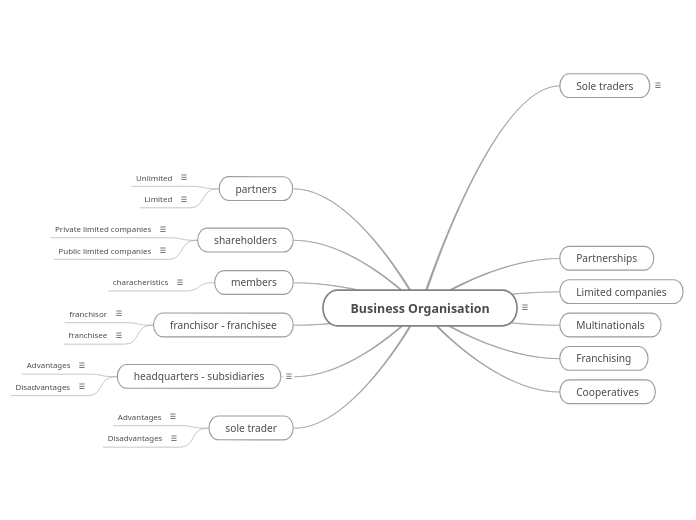Business Organisation
There are six types of business organisations in the private sector: sole traders partnerships private limited companies public limited companies cooperatives franchising
Sole traders
This is the simplest type of business. "Sole trader" means that the business is owned and operated by just one person who is entirely responsible for his own business debts. A sole trade has unlimited liability.
Partnerships
Limited companies
Multinationals
Franchising
Cooperatives
partners
Unlimited
all the partners are liable for the debts of any of the other partners if the business goes bankrupt, the partners can lose their personal assets
Limited
some of the partners only contribute capital to the business and do not take an active role in management they are liable only for the amount of money they initially invest in the business at least one partner must have unlimited liability
shareholders
Private limited companies
they have "Ltd." after their company name they cannot be quoted on the Stock Exchange their shares can only be sold with the agreement of all the shareholders
Public limited companies
they have "Plc." after their company name they can be quoted on the Stock Exchange their shares can be sold without restrictions
members
characheristics
they are business organisations where all the employees have a vote, no matter how much work or money they put into the co-op no member can dominate all the members help in the running of the company all members share the profits equally all members have limited liability
franchisor - franchisee
franchisor
the person who offers the franchisee the right to use his trade name and to sell his products he has to invest relatively little capital in distribution outlets he receives an initial payment from the franchisee and a percentage of his annual profits
franchisee
the person who receives the right to use the franchisor's trade name and to sell his products the franchisee receives the shop furniture in the company style, marketing support, training and commercial advice from the franchisor they are their own bosses they have responsibility for running the company they don't need to invest capital in advertising campaigns if the trade name of the franchisor's business is well-known
headquarters - subsidiaries
Multinationals have a complicated structure. When companies start producing in other countries they become "multinationals". They have their headquarters in just one country. holding company (owns other companies) subsidiaries (companies owned by holding companies)
Advantages
jobs are created and unemployment is reduced investment in buildings and machinery increases output of goods and services imports may be reduced taxes paid by the multinationals increase local government funds
Disadvantages
the jobs created are often unskilled local companies may be forced out of business (multinationals are more efficient and have lower costs) multinationals often use up non-renewable resources multinalionals may have a lot of influence on both the government and the economy of the country local interests may be ignored
sole trader
Advantages
has complete control over his business keeps all the profits can make decisions quickly
Disadvantages
has unlimited liability (he can lose all his personal assets if the business fails) all the capital is provided only by one person there is no one to share the workload or exchange ideas with
